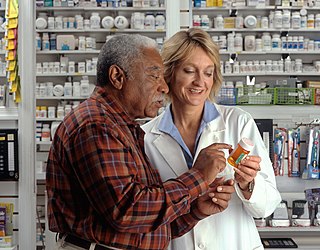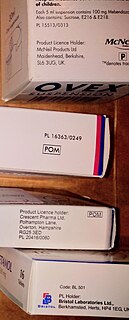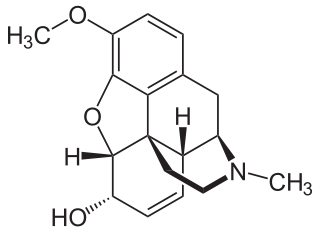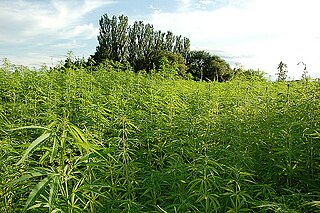
The Controlled Substances Act (CSA) is the statute establishing federal U.S. drug policy under which the manufacture, importation, possession, use, and distribution of certain substances is regulated. It was passed by the 91st United States Congress as Title II of the Comprehensive Drug Abuse Prevention and Control Act of 1970 and signed into law by President Richard Nixon. The Act also served as the national implementing legislation for the Single Convention on Narcotic Drugs.

Pseudoephedrine (PSE) is a sympathomimetic drug of the phenethylamine and amphetamine chemical classes. It may be used as a nasal/sinus decongestant, as a stimulant, or as a wakefulness-promoting agent in higher doses.

Over-the-counter (OTC) drugs are medicines sold directly to a consumer without a requirement for a prescription from a healthcare professional, as opposed to prescription drugs, which may be supplied only to consumers possessing a valid prescription. In many countries, OTC drugs are selected by a regulatory agency to ensure that they contain ingredients that are safe and effective when used without a physician's care. OTC drugs are usually regulated according to their active pharmaceutical ingredient (API) rather than final products. By regulating APIs instead of specific drug formulations, governments allow manufacturers the freedom to formulate ingredients, or combinations of ingredients, into proprietary mixtures.

Pharmacists, also known as chemists or druggists, are health professionals who deal with the preparation, properties, effects and proper use of medicines. Pharmacists provide pharmaceutical care to patients and promote public health by serving as health advisors and care providers in the community. Pharmacists undergo university or graduate-level education to understand the biochemical mechanisms and actions of drugs, drug uses, therapeutic roles, side effects, potential drug interactions, and monitoring parameters. This is mated to anatomy, physiology, and pathophysiology. Pharmacists interpret and communicate this specialized knowledge to patients, physicians, and other health care providers.

A prescription drug is a pharmaceutical drug that legally requires a medical prescription to be dispensed. In contrast, over-the-counter drugs can be obtained without a prescription. The reason for this difference in substance control is the potential scope of misuse, from drug abuse to practicing medicine without a license and without sufficient education. Different jurisdictions have different definitions of what constitutes a prescription drug.

CVS Pharmacy, Inc. is an American retail corporation. A subsidiary of CVS Health, it is headquartered in Woonsocket, Rhode Island. It was also known as, and originally named, the Consumer Value Store and was founded in Lowell, Massachusetts, in 1963.

The regulation of therapeutic goods, defined as drugs and therapeutic devices, varies by jurisdiction. In some countries, such as the United States, they are regulated at the national level by a single agency. In other jurisdictions they are regulated at the state level, or at both state and national levels by various bodies, as in Australia.
Drug diversion is a medical and legal concept involving the transfer of any legally prescribed controlled substance from the individual for whom it was prescribed to another person for any illicit use. The definition varies slightly among different jurisdictions, but the transfer of a controlled substance alone usually does not constitute a diversion, since certain controlled substances that are prescribed to a child are intended to be administered by an adult, as directed by a medical professional. The term comes from the "diverting" of the drugs from their original licit medical purpose. In some jurisdictions, drug diversion programs are available to first time offenders of diversion drug laws, which "divert" offenders from the criminal justice system to a program of education and rehabilitation.

The Narcotic Drugs and Psychotropic Substances Act, 1985, commonly referred to as the NDPS Act, is an Act of the Parliament of India that prohibits a person the production/manufacturing/cultivation, possession, sale, purchasing, transport, storage, and/or consumption of any narcotic drug or psychotropic substance. The bill was introduced in the Lok Sabha on 23 August 1985. It was passed by both the Houses of Parliament, received assent from then President Giani Zail Singh on 16 September 1985, and came into force on 14 November 1985. The NDPS Act has since been amended four times — in 1988, 2001, 2014 and 2021. The Act extends to the whole of India and it applies also to all Indian citizens outside India and to all persons on ships and aircraft registered in India.
An online pharmacy, internet pharmacy, or mail-order pharmacy is a pharmacy that operates over the Internet and sends orders to customers through mail, shipping companies, or online pharmacy web portal.

A drug is any chemical substance that causes a change in an organism's physiology or psychology when consumed. Drugs are typically distinguished from food and substances that provide nutritional support. Consumption of drugs can be via inhalation, injection, smoking, ingestion, absorption via a patch on the skin, suppository, or dissolution under the tongue.

Codeine is an opiate and prodrug of morphine used to treat pain, coughing, and diarrhea. It is found naturally in the sap of the opium poppy, Papaver somniferum. It is typically used to treat mild to moderate degrees of pain. Greater benefit may occur when combined with paracetamol (acetaminophen) or a nonsteroidal anti-inflammatory drug (NSAID) such as aspirin or ibuprofen. Evidence does not support its use for acute cough suppression in children or adults. In Europe, it is not recommended as a cough medicine in those under 12 years of age. It is generally taken by mouth. It typically starts working after half an hour, with maximum effect at two hours. Its effects last for about four to six hours. Codeine exhibits abuse potential similar to other opioid medications.

A pharmacy is a retail shop which provides pharmaceutical drugs, among other products. At the pharmacy, a pharmacist oversees the fulfillment of medical prescriptions and is available to counsel patients about prescription and over-the-counter drugs or about healthcare and wellness issues. A typical pharmacy would be in the commercial area of a community. Mail-order dispensing is a recent development.
The National Conference of Commissioners on Uniform State Laws developed the Uniform State Narcotic Drug Act in 1934 due to the lack of restrictions in the Harrison Act of 1914. The Harrison Act was a revenue-producing act and, while it provided penalties for violations, it did not give authority to the states to exercise police power regarding either seizure of drugs used in illicit trade or punishment of those responsible.
The major drug laws of India are the Narcotic Drugs and Psychotropic Substances Act (1985) and the Prevention of Illicit Trafficking in Narcotic Drugs and Psychotropic Substances Act (1988).
Drug policy of Slovakia is the legislative framework that governs all aspects of legal drugs and illegal drugs on the territory of Slovakia. It was established with the country's creation on 1 January 1993; the Slovak Republic taking over all commitments of the former Czechoslovakia. Both domestic and international law governs the manufacture, sale, transport and use of most drugs. Alcohol is the most used drug in Slovakia, featuring prominently in the Slovak culture. Slovakia consistently ranks among the top alcohol consuming countries in the world.
The Drugs and Cosmetics Rules, 1940 are the rules which the government of India established through the Drugs and Cosmetics Act, 1940. These rules classify drugs under given schedules and present guidelines for the storage, sale, display and prescription of each schedule.
The State Drugs and Medications Control Service is a national law enforcement agency of executive authority responsible for drafting state policy, legal regulation, control and monitoring in combating trafficking drugs, psychotropic substances, medications and their precursors. The Service is specially authorized to address and solve problems relating to traffic in narcotic drugs, psychotropic substances, and their precursors; the Service is also authorized to combat the illicit drug trafficking. Commonly was known as The Drugs Control Service.

Cannabis in Germany is legal for certain limited medical contexts, but illegal for recreational usage, though possession of minor amounts is not always prosecuted.

The Indonesian Food and Drug Authority or Badan POM/BPOM or Indonesian FDA, is a government agency of Indonesia, BPOM is responsible for protecting public health through the control and supervision of prescription and over-the-counter pharmaceutical drugs (medications), vaccines, biopharmaceuticals, dietary supplements, food safety, traditional medicine and cosmetics. The task and purposes of this agency is similar to USFDA.












